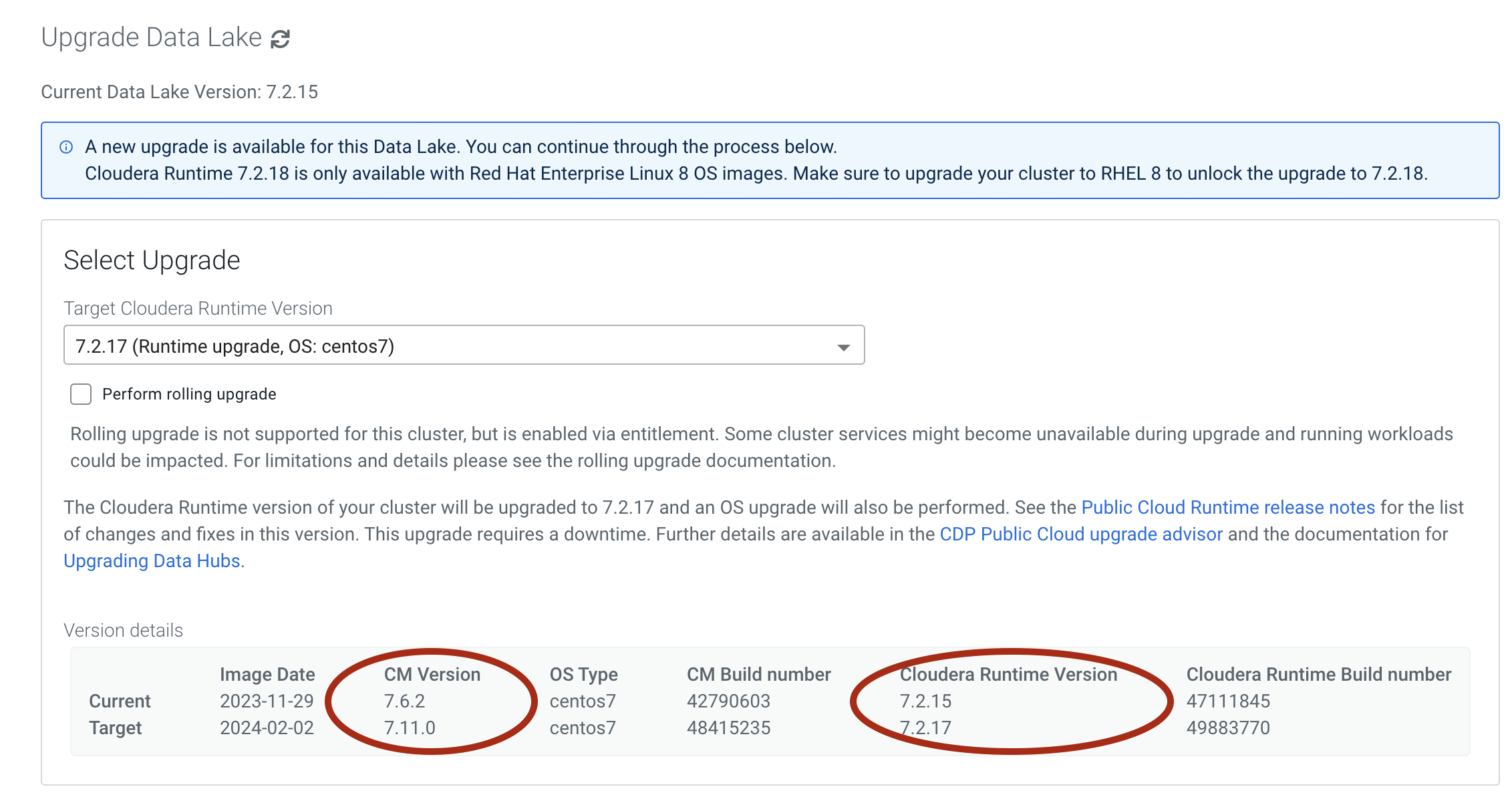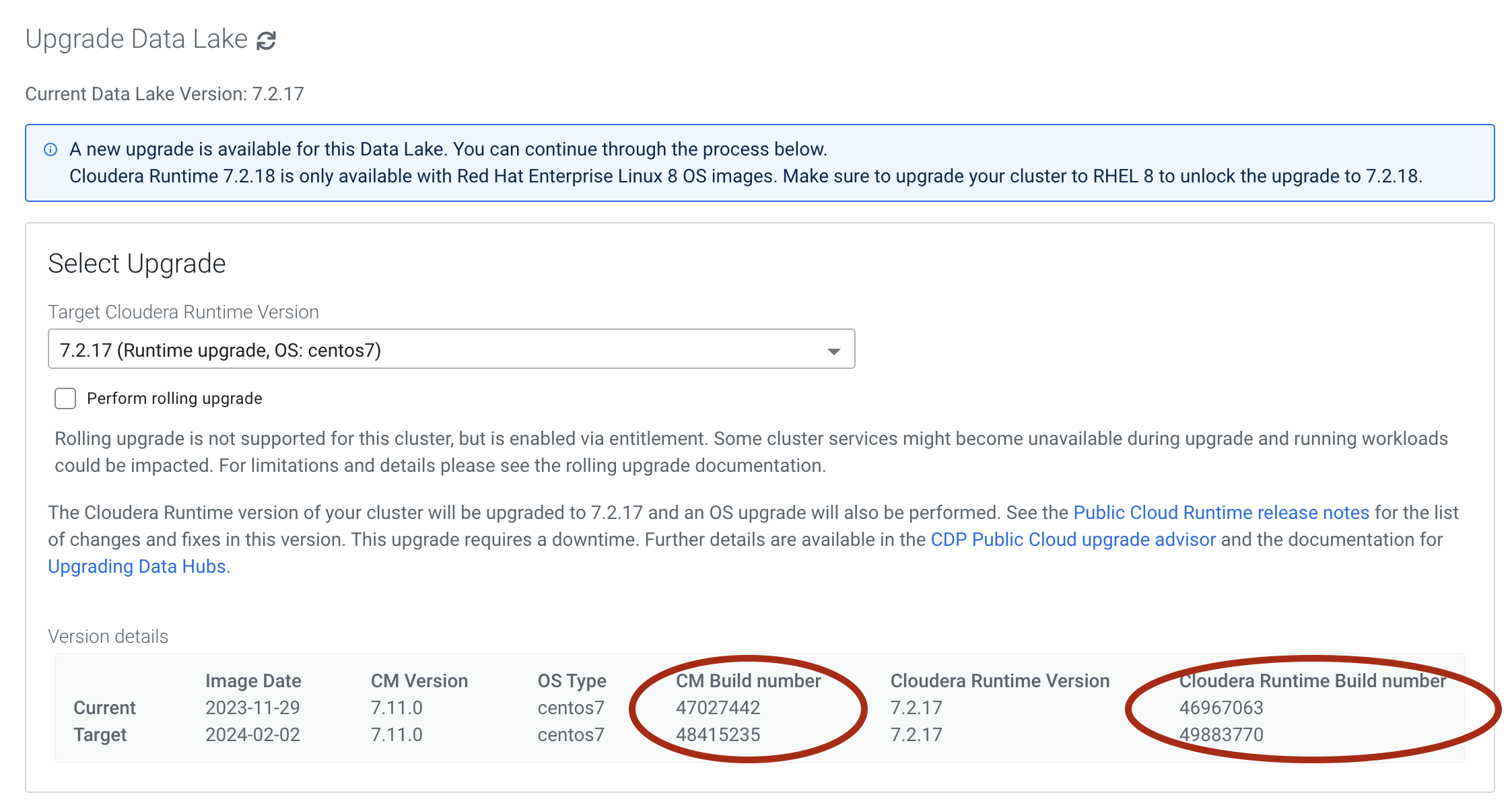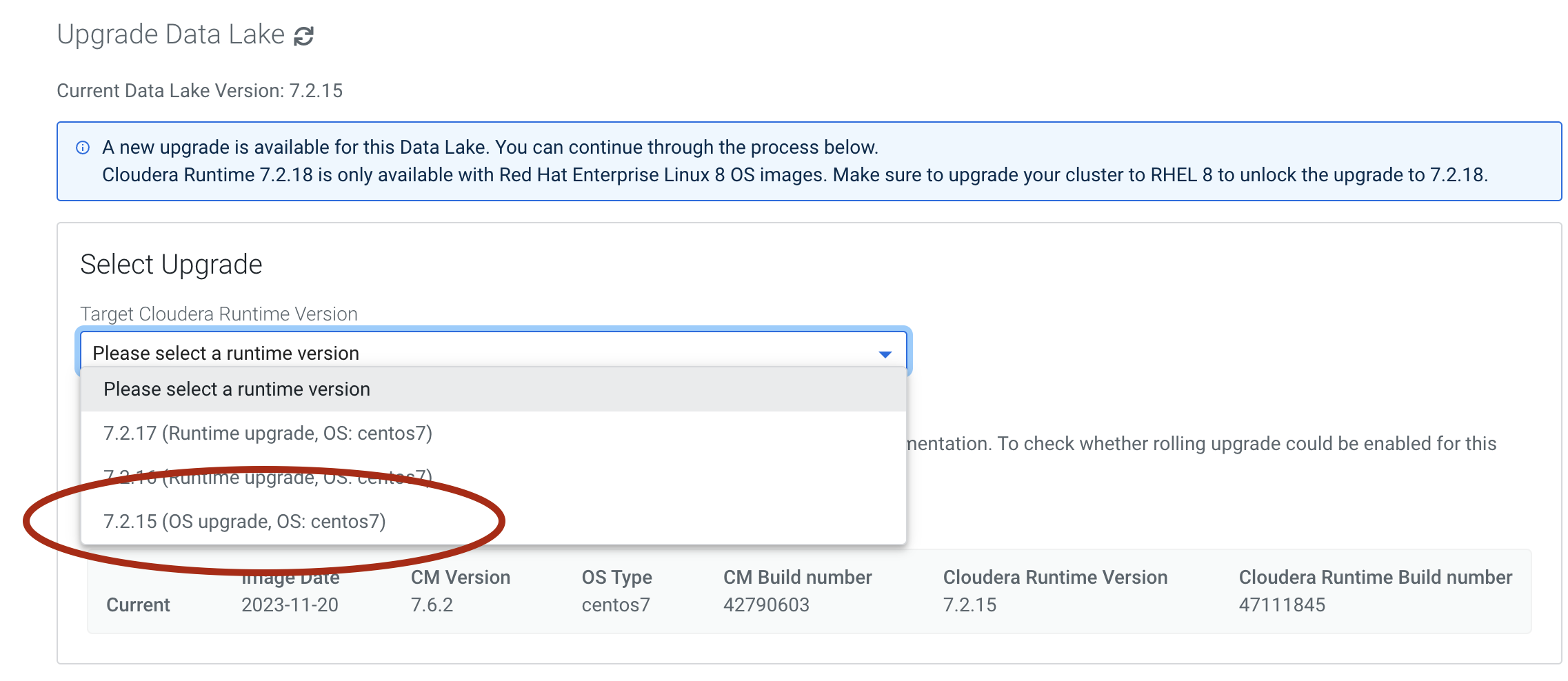Upgrading a Data Lake
When new versions or builds of Cloudera Runtime or Cloudera Manager are available for the Data Lake service, you can initiate a Data Lake upgrade. An OS upgrade may also be available. Use either the CDP CLI or the Cloudera Management Console to initiate an upgrade.
There are several potential types of Data Lake upgrades:
- Cloudera Runtime and Cloudera Manager version upgrades, called "major/minor version" upgrades, which are available when a new Cloudera Runtime and Cloudera Manager version is released.
- Service pack upgrades, which do not change the major/minor Cloudera Runtime or Cloudera Manager release, but upgrade the Data Lake to the latest Cloudera Manager and/or Cloudera Runtime service packs available in the given version. These upgrades are made available as needed and can deliver targeted bug fixes for Cloudera Runtime, Cloudera Manager, or both.
- OS upgrades, which do not change any Cloudera Manager or Cloudera Runtime builds, but update the underlying cloud image. If an OS upgrade is available along with a major/minor version upgrade, the major/minor upgrade will incorporate the OS upgrade.
- Rolling upgrades allow you to upgrade the Cloudera Runtime and OS of Data Lakes and Cloudera Data Hub clusters, without stopping the cluster and its services. This means that you can upgrade a Data Lake without stopping the attached Cloudera Data Hub cluster and Data Services, or upgrade a Cloudera Data Hub cluster without workload downtime. Rolling upgrades for the Data Lake are limited to certain Data Lake Cloudera Runtime versions and shapes. For more information, see Data Lake rolling upgrades.
The type of upgrade that is available for a Data Lake is explicit on the Upgrade tab of the Data Lake details page. Any available upgrades are visible in the Target Runtime Version drop-down menu. For example:



Process
- Check for a newer Cloudera Manager and Cloudera Runtime version or build, and a new OS image.
- Automatically create a backup of the Data Lake (for major/minor and service pack upgrades).
- Execute the Data Lake upgrade.
- Verify the Data Lake state.
Major/minor version upgrades
Major/minor version upgrades are available as new versions of Cloudera Runtime and Cloudera Manager are released. Version upgrades combine a Cloudera Runtime and Cloudera Manager upgrade into one operation. For example, this upgrade might involve upgrading from Cloudera Runtime 7.2.8 to 7.2.9, and Cloudera Manager from 7.4.0 to 7.4.1.
Data Lake version upgrades require you to stop all of the Cloudera Data Hub clusters in the environment before performing the Data Lake upgrade. The upgrade process stops all of the Data Lake services, downloads and distributes the new Cloudera Runtime, restarts the services, and deletes the old Cloudera Runtime. This process includes launching entirely new instance(s) from new cloud image(s). Once the Data Lake upgrade is complete, you can then either upgrade your Cloudera Data Hub clusters to the same version as the Data Lake (if your Cloudera Data Hub cluster type is supported for upgrade), or delete and recreate the clusters with the new Data Lake version. If your Cloudera Data Hub is on Cloudera Runtime version 7.2.16 or later, it is compatible with a Data Lake on a newer Cloudera Runtime version (7.2.17+). You can independently upgrade your Cloudera Data Hub clusters at a later time if you choose to, though it is not required
Service pack upgrades
The service pack upgrade process checks to see if a new Cloudera Manager or Cloudera Runtime build is available, and then upgrades the Data Lake to the newest builds. Service pack upgrades do not upgrade to a new version of Cloudera Manager or Cloudera Runtime; they only upgrade to the latest service pack of a particular version. For example, a service pack upgrade cannot take the Data Lake from Cloudera Runtime version 7.2.11 to version 7.2.12, but instead upgrades Cloudera Runtime 7.2.11 to a newer 7.2.11 build. These upgrades are made available as needed and can deliver targeted bug fixes for Cloudera Runtime, Cloudera Manager, or both. If desired, specific older service packs can also be chosen using the CDP CLI. The service pack upgrade process follows the same steps as the version upgrade process.
OS upgrades
OS upgrades may be available sporadically as new images are created. OS upgrades are typically released to address security vulnerabilities or other issues on the host system. The OS upgrade process includes launching entirely new instances with the new OS image. An OS upgrade triggers the execution of any pre-service-deployment, post-cluster-manager-start, or post-service-deployment recipes.
Rolling upgrades
Certain Data Lake upgrades can be performed in a rolling fashion, depending on the Data Lake shape, Data Lake OS, and the Cloudera Runtime version you are upgrading to and from. For more information, see Data Lake rolling upgrades.
